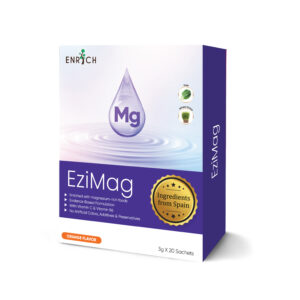Wellness
What does Magnesium do for your Body?
What is Magnesium and what does it do?
Magnesium is the eleventh most abundant element and is an important mineral, playing a role in over 300 enzymatic reactions in the human body.1 Because magnesium is required for so many functions, it is a nutrient that the body needs to function optimally and stay healthy. The daily recommended intake of magnesium for adults is around 300-400 mg/day.1
Why do we need Magnesium?
Helps regulate muscle contractions
Magnesium acts as a natural calcium blocker, helping the muscle cells to relax after contracting.2 When the body does not have enough magnesium to compete with calcium, the muscle may contract too much, causing cramps or spasms.
The study of volunteers who suffered from regular leg cramps was given 300 mg magnesium showed a trend towards less cramps.3
Improve sleep quality
Magnesium may improve sleep quality by helping the body and mind to relax. This relaxation helps to fall asleep faster and may improve sleep quality.4
In a study, those taking 500 mg magnesium supplement daily fell asleep faster. Besides, it improved sleep quality and decreased symptoms of insomnia.5
Lower blood pressure
Magnesium may decrease blood pressure by improving blood flow. The mineral helps to prevent blood vessels from constricting, which can increase blood pressure.6
In one study, people who took 450 mg of magnesium daily experienced a fall in systolic and diastolic blood pressure values by 20.4 mmHg and 8.7 mmHg respectively.7
Improve blood sugar control
Insulin and glucose are important regulators of magnesium metabolism, which need magnesium to function properly. Thus, magnesium helps regulate insulin and moves sugar out of the blood and into the cells for storage.8
An analysis of eight studies showed that taking a magnesium supplement significantly reduced fasting blood sugar levels in participants with type 2 diabetes.9
Maintaining bone health
Magnesium is essential for healthy bone formation and influences the activities of osteoblasts and osteoclasts.10 It also affects the concentrations of both parathyroid hormone and the active form of vitamin D, which are the main regulators of bone homeostasis.
One short-term study found that 290 mg/day elemental magnesium in postmenopausal women with osteoporosis suppressed bone turnover, suggesting that bone loss decreased.11
Does Magnesium interact with medications or other dietary supplements?
Antibiotics
Magnesium can form insoluble complexes with antibiotics, and might not be absorbed if taken too soon before or after taking a dietary supplement that contains magnesium. These antibiotics should be taken at least 2 hours before or 4-6 hours after a magnesium-containing supplement.12
Diuretics
Chronic treatment with loop diuretics, can increase the loss of magnesium through urine and lead to magnesium depletion.13
Bisphosphonates
Magnesium-rich supplements when taken too soon before or after can decrease the absorption of oral bisphosphonates, used to treat osteoporosis.14 Use of magnesium-rich supplements and oral bisphosphonates should be separated by at least 2 hours.

Why EziMag?
- Evidence-based formulation.
- Clinically proven to increase solubility for better absorption, increase the bioavailability, and improve stability of magnesium.
- Enriched with whole food sources of magnesium such as kale and wheatgrass that are wholesome and nutritious.
- Comes with vitamin C and vitamin B6.
- Gentle to the stomach.
- Easy to swallow, in powder form.
Health Food
References
- Recommended Nutrient Intake (RNI) for Malaysia 2017. Putrajaya: National Coordinating Committee on Food and Nutrition (NCCFN), Ministry of Health (MOH) Malaysia, 2017.
- Bilbey D. L., Prabhakaran V. M. Muscle cramps and magnesium deficiency: case reports. Cam Fam Physician. 1996 Jul; 42: 1348-1351.
- Roffe C., Sills S., Crome P., et al. Randomised, cross-over, placebo-controlled trial of magnesium citrate in the treatment of chronic persistent leg cramps. Med Sci Monit. 2002 May; 8(5): CR326-30.
- Wienecke E., Nolden C. Long-term HRV analysis shows stress reduction by magnesium intake. MMW Fortschr Med. 2016 Dec; 158(6): 12-16.
- Abbasi B., Kimiagar M., Sadeghniiat K., et al. The effect of magnesium supplementation on primary insomnia in elderly: A double-blind placebo-controlled clinical trial. J Res Med Sci. 2012 Dec; 17(12): 1161-1169.
- Bo S., Pisu E. Role of dietary magnesium in cardiovascular disease prevention, insulin sensitivity and diabetes. Curr Opin Lipidol. 2008 Feb; 19(1): 50-6.
- Guerrero-Romero F., Rodriguez-Moran M. The effect of lowering blood pressure by magnesium supplementation in diabetic hypertensive adults with low serum magnesium levels: a randomized, double-blind, placebo-controlled clinical trial. Journal of Human Hypertension. 2009 Apr; 23(4): 245-51.
- Barbagallo M., Dominguez L. J. magnesium and type 2 diabetes. World J Diabetes. 2015 Aug; 6(10): 1152-1157.
- Song J., He K., Levitan E. B. Effects of oral magnesium supplementation on glycaemic control in type 2 diabetes: a meta-analysis of randomized double-blind controlled trials. Diabet Med. 2006 Oct; 23(10): 1050-6.
- Rude R. K., Singer F. R., Gruber H. E. Skeletal and hormonal effects of magnesium deficiency. J Am Coll Nutr 2009; 28: 131–41.
- Aydin H., Deyneli O., Yavuz D., et al. Short-term oral magnesium supplementation suppresses bone turnover in postmenopausal osteoporotic women. Biol Trace Elem Res 2010; 133: 136-43.
- Arayne M. S., Sultana N., Hussain F. Interactions between ciprofloxacin and antacids–dissolution and absorption studies. Drug Metabol Drug Interact 2005; 21: 117-29.
- Sarafidis P. A., Georgianos P. I., Lasaridis A. N. Diuretics in clinical practice. Part II: electrolyte and acid-base disorders complicating diuretic therapy. Expert Opin Drug Saf 2010; 9: 259-73.
- Dunn C. J., Goa K. L. Risedronate: A review of its pharmacological properties and clinical use in resorptive bone disease. Drugs 2001; 61: 685-712.



Great info on magnesium and health
Really enjoyed this post.Much thanks again. Much obliged.
Glad to be one of several visitants on this awe inspiring web site : D.